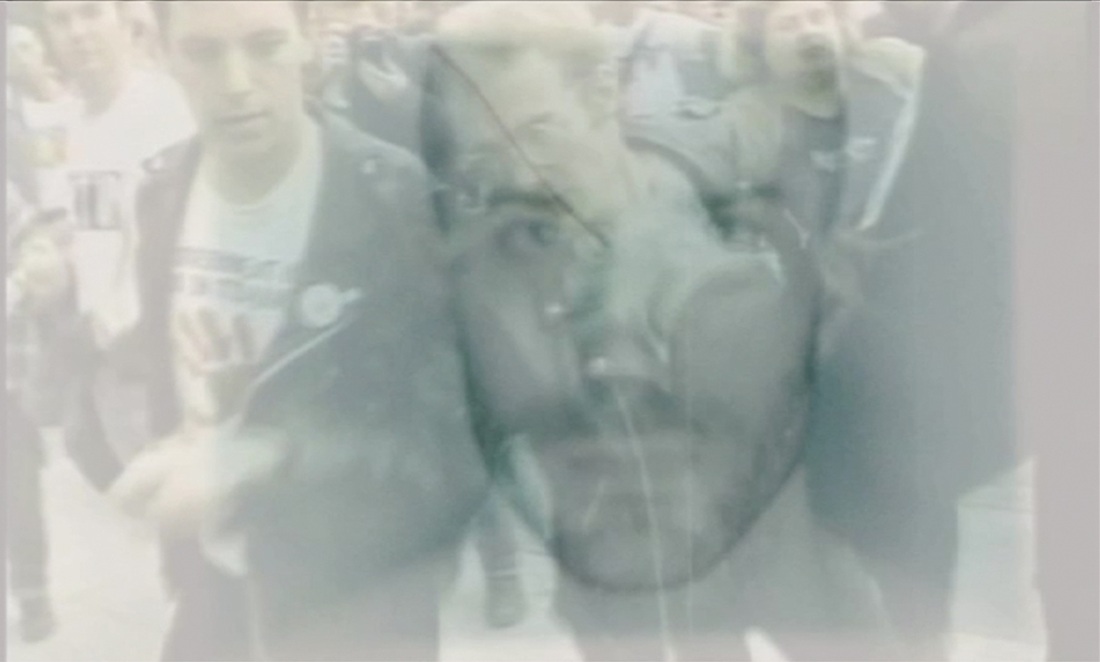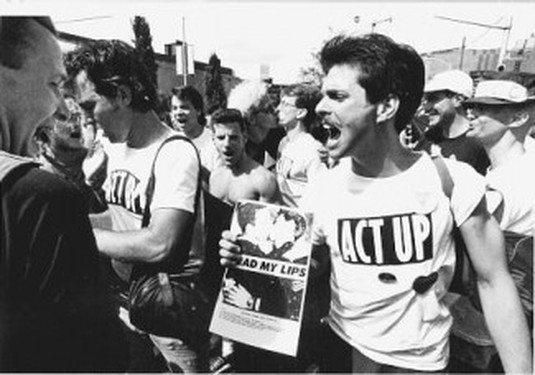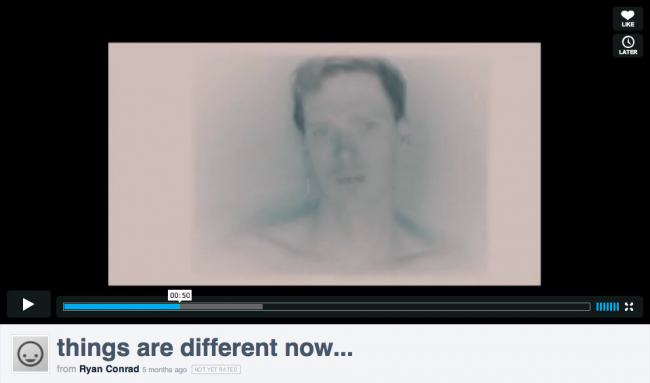|
The Breadcrumbs widget will appear here on the published site.
Things Are Different NowRyan Conrad recently pulled his film from the Frameline San Francisco International LGBT Film Festival because the festival, despite a robust budget and years of protest from filmmakers, audiences and activists, continues to accept money from the Israeli consulate. Conrad joins a growing list of artists who are taking a stand in the cultural commons, and reminding us that art can be political outside of its content. Art Threat asked Conrad a few questions over email. You can read that conversation and the filmmaker’s statement about his intervention adapted here for Quail Bell Magazine below. You can also find a link and password to his film, things are different now, which he has generously made available to our readers through this Friday. PINKWASHING, QUEER CINEMA AND HISTORY Art Threat: Why did you decide to make a short on this topic? Ryan Conrad: As a young fag coming of age in a mill town in central Maine I didn’t have any connection to older gay men. I think a lot about why those generational disconnects exist, from the criminalization and stigmatization of intergenerational relationships between gay men, to urban flight and the literal decimation of an entire generation through the mostly deadly years of the AIDS crisis in the U.S. This short is a reflection on that disconnect and the differences in experience by younger queers like me who have never known a world without HIV/AIDS (or safer sex) and never experienced the loss of life on the scale of those gay men that came a generation before me. You say that now gay men are thinking about white weddings and military service, which definitely feels like a small jab at contemporary mainstream queer activism. Can you speak about this generational gulf between the queer and AIDS activism of earlier generations and what prevails now, including gay marriage activism? Contemporary gay and lesbian “equality” politics are pathetic. As if joining the racist neocolonialist military industrial complex, inviting the state into our bedrooms through a marriage contract (or arguing that gay marriage is a good way to access health care, or worse that gay marriage will end AIDS), or that the prison industrial complex is a helpful way to address the issue of anti-queer and anti-trans violence—like, when did our politics get so shitty? When did equality, which essentially means inclusion in the violently unjust status quo, become our only political goal? Looking back to the political organizing during the AIDS crisis in the 1980's and early 1990's that demanded “money for AIDS, not for war," universal health care, housing for all, and took an explicitly intersectional approach to political change is really energizing for me and deeply informs my present work with the radical queer activist group Against Equality. 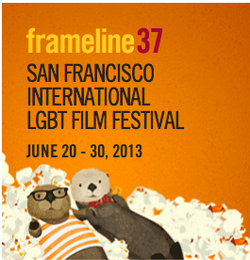 You pulled your film from the Frameline San Francisco International LGBT Film Festival over Palestine/Israel issues. Can you speak about that, and maybe talk about this as a tactic in the Palestinian solidarity and justice movement? For about a decade groups like the U.S.-based Queers Undermining Israeli Terrorism (QUIT) has been urging filmmakers and moviegoers to boycott Frameline over their complicity with Israeli pinkwashing. Pinkwashing, in this context, is a term used to describe the Israeli government’s promotion of gay rights and culture as deliberate strategy to conceal the continuing violations of Palestinians’ human rights. Frameline has been accepting sponsorship from the Israeli consulate for many years and therefore participating in the film festival would mean violating the larger international boycott called for by the Palestinian Campaign for the Academic and Cultural Boycott of Israel (PACBI). Well-known activists and artists like Alice Walker, Barbara Hammer, Angela Davis, Sarah Schulman, John Greyson, Richard Fung, Susan Stryker, and numerous others have already publicly endorsed the boycott against Frameline and this year the groups QUIT and Gay Shame are organizing a demonstration outside the festival’s opening night gala on June 20th. What film or films would you recommend people watch with your short? James Wentzy’s short experimental film By Any Means Necessary (1994) explores similar themes and does something really interesting and provocative by putting the AIDS crisis in dialog with the Holocaust. There is also Jim Hubbard’s insightful new documentary United in Anger: A History of ACT UP (2012), which actually uses much of the footage James shot or archived over the last two decades. Neither Jim Hubbard’s nor David France’s rather misleading Oscar-nominated film How to Survive a Plague (2012) would have been possible without James’ footage and archival work which is primarily housed in the AIDS Activist Videotape Collection at the New York Public Library. Which living filmmaker do you admire right now and why? And which activist? As you can likely tell from my previous answer, I’m a big fan of James Wentzy who has been a wonderful mentor to me over the years. In terms of people making exciting queer film and video today, I’d have to say the works of Eric Stanley, Chris Vargas, David Oscar Harvey, Frédéric Moffet, Louis Chavez, Carlos Motta, and Vincent Chevalier amongst many others! These folks are making provocative film and video projects that push back against the monotony of today’s infinitely boring gay and lesbian politics and/or take innovative approaches to activating queer and trans history. I’m also looking forward to forthcoming documentaries about the NJ4, Kate Bornstein, and Miss Major. You can watch Conrad’s short film by following this link and entering the password “ArtThreat.” CONRAD’S TAKE ON POLITICS AND FILM FESTIVALS After showing my short experimental film about HIV/AIDS and intergenerational queer politics called things are different now… at the MIXNYC experimental film festival in the fall of 2012, I started receiving screening requests for my work at film festivals from all over North America and Europe. As an emerging artist, it felt nice to have broad interest in my work from a vast array of curators and to feel that my do-it-yourself, no-budget, and unapologetically political artistic work was being valued. Many film festivals have some considerable problems when artists whose work is shown receive no compensation, despite the fact that the festival operates with many corporate sponsors, a large pool of volunteer labor, and that both artists and audience pay fees to show/view films–but I still like the idea of groups of people coming together to experience something collectively, so I’ll save my lengthy critique of contemporary film festivals for another day… This past March, I received a request to show my work at Frameline, the oldest and quite possibly the most prestigious LGBT film festival on the planet. I was excited about the opportunity, having never shown work there before, but I was also aware of a particular problem with this film festival: its complicity with the Israeli government’s pinkwashing of human rights abuses perpetrated against Palestinians. From a recent letter to the Frameline Board of Directors demanding they stop accepting sponsorships from the Israeli Consulate: LGBTQI Palestinians have asked international queers to respect the cultural and academic boycott of Israel called by Palestinian civil society in 2005. Please read their statement. The call of Palestinian civil society makes it clear that any institution sponsored by or partnering with any agency of the Israeli government is a target of boycott by people who support a just peace in the region. Boycott, divestment and sanctions are time-honored nonviolent strategies for political and social change. Queer Palestinian groups and other queer organizations have urged Frameline to take a stand against the injustices suffered by the Palestinians under occupation by Israel. This letter was signed by well-known queer and trans artists and educators like John Greyson, Angela Davis, Susan Stryker, Barbara Hammer, Sarah Schulman, Eric Stanley, Mattilda Bernstein Sycamore, and Alice Walker, amongst many others. 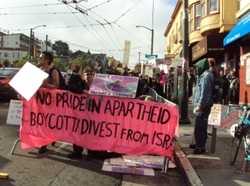 Frameline has also been targeted by Bay Area activists like Queers Undermining Israeli Terrorism (QUIT) for a decade now, and the broader Palestinian Campaign for the Academic and Cultural Boycott of Israel has garnered support from an international roster of artists, educators, and activists including numerous Israelis opposed to their own government’s treatment of Palestinians. Knowing all this, I was reluctant to send my work to Frameline to be screened. After inquiring whether or not the Israeli government would once again sponsor the festival I was told that it was unclear and depended on programming which was not finalized at the time I inquired. I hesitantly sent my work to one of the friendly and accommodating festival programmers only to learn later that the Israeli government was indeed sponsoring the festival in 2013. At that point the decision I had to make was crystal clear–I have not, and never will, cross a picket line. After pulling my short film from the festival and chatting it over with friend and fellow artist provocateur Louis Chavez, I learned that many other mutual friends of ours were similarly contacted about sending work to Frameline this year. None of us are well-known and we carry little political clout or cultural capital compared to those already involved in the boycott mentioned above. Although we have far more to lose than established artists by not showing our work, we still stuck by our ethics. We know our decision to stand with LGBTQI Palestinians is unlikely to bring an end to Frameline’s partnership with Israel this year, but I can only hope that our actions will help encourage other young filmmakers to find the courage to say “No!” to Frameline, despite the much-needed publicity and potential opportunities that participating in the festival affords to emerging artists. Please consider contacting Frameline ([email protected] / 415-703-8650) or sign the petition to let Frameline know how you feel! ***This post originally appeared in Art Threat and was re-published with permission.*** Follow Quail Bell Magazine on Facebook for behind-the-scenes looks, shout-outs, calls to action, giveaways, and more! CommentsComments are closed.
|
|

